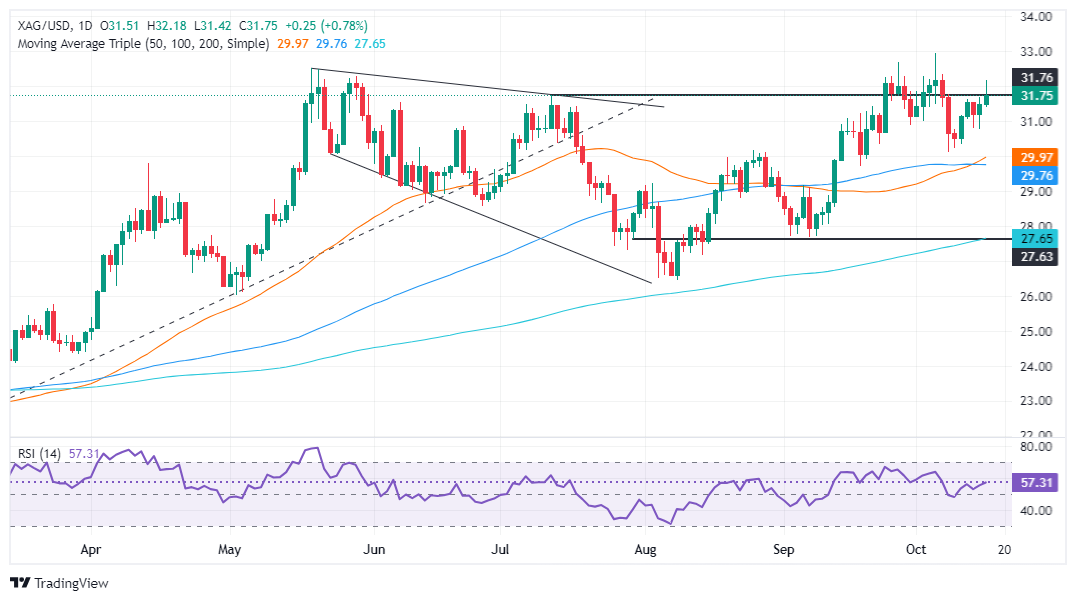Silver Price Forecast: XAG/USD surges as bulls target $32.00

- XAG/USD climbs to $31.74, driven by falling US Treasury yields and stronger risk sentiment in the market.
- Momentum favors bulls, with RSI clearing key resistance, suggesting further upside potential towards $33.00.
- Key support lies at $31.60, with a break below potentially leading Silver to retest the $30.76 level.
Silver prices climbed on Wednesday as US Treasury yields fell, a tailwind for the non-yielding metal. An improvement in risk appetite underpins the precious metal sector, pushing the grey metal to hit a seven-day high at $32.17. At the time of writing, XAG/USD trades at $31.74 and gains more than 0.85%.
XAG/USD Price Forecast: Technical outlook
After diving almost vertically from a year-to-date (YTD) peak of $32.95 to $30.12 in three days, Silver is recovering, with buyers eyeing a test of $33.00.
The momentum remains constructive, supporting bulls as shown by the Relative Strength Index (RSI. The RSI cleared the 55 peak with enough room to spare before turning overbought.
Hence, Silver’s path of least resistance is tilted to the upside. The first resistance would be the $32.00 figure, followed by today’s high at $32.17. Once those levels are surpassed, the next stop would be the May 20 swing high at $32.51 before challenging the YTD high at $32.95.
Conversely, if XAG/USD slips below $31.60, Silver could drop to the weekly low of $30.76. This clears the path to an October 8 low of $30.12 if surpassed.
XAG/USD Daily Chart
Silver FAQs
Silver is a precious metal highly traded among investors. It has been historically used as a store of value and a medium of exchange. Although less popular than Gold, traders may turn to Silver to diversify their investment portfolio, for its intrinsic value or as a potential hedge during high-inflation periods. Investors can buy physical Silver, in coins or in bars, or trade it through vehicles such as Exchange Traded Funds, which track its price on international markets.
Silver prices can move due to a wide range of factors. Geopolitical instability or fears of a deep recession can make Silver price escalate due to its safe-haven status, although to a lesser extent than Gold’s. As a yieldless asset, Silver tends to rise with lower interest rates. Its moves also depend on how the US Dollar (USD) behaves as the asset is priced in dollars (XAG/USD). A strong Dollar tends to keep the price of Silver at bay, whereas a weaker Dollar is likely to propel prices up. Other factors such as investment demand, mining supply – Silver is much more abundant than Gold – and recycling rates can also affect prices.
Silver is widely used in industry, particularly in sectors such as electronics or solar energy, as it has one of the highest electric conductivity of all metals – more than Copper and Gold. A surge in demand can increase prices, while a decline tends to lower them. Dynamics in the US, Chinese and Indian economies can also contribute to price swings: for the US and particularly China, their big industrial sectors use Silver in various processes; in India, consumers’ demand for the precious metal for jewellery also plays a key role in setting prices.
Silver prices tend to follow Gold’s moves. When Gold prices rise, Silver typically follows suit, as their status as safe-haven assets is similar. The Gold/Silver ratio, which shows the number of ounces of Silver needed to equal the value of one ounce of Gold, may help to determine the relative valuation between both metals. Some investors may consider a high ratio as an indicator that Silver is undervalued, or Gold is overvalued. On the contrary, a low ratio might suggest that Gold is undervalued relative to Silver.
